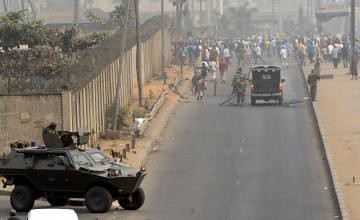
Nigerian troops block protesters in Lagos after the Federal Government imposed a settlement regarding the general strike over cancellation of fuel subsidies. People have objected to the deployment., a photo by Pan-African News Wire File Photos on Flickr.
No to military occupation
By Editorial
Nigerian Nation
UNDER SIEGE:Protesters on their way to Freedom Park being stopped by soldiers at Ojota, Lagos Mainland . •President Goodluck Jonathan and his coterie of advisers must be feeling happy with themselves now
They have countered siege on their governmental psyche, fired by irreverent but peaceful anti-subsidy removal protesters with another siege, powered by menacing soldiers. The democratic president has staged a coup against the democratic ideal of peaceful dissent and he is fated to live happily ever after!
By deploying soldiers to the streets of Lagos, Abuja, Kano, Kaduna and other parts of the country, considered by the Jonathan administration as hot bed of protests against a wrong-headed, misguided and ill-thought out energy policy they sell to the populace as the “withdrawal of subsidy on petroleum products”, the president has confirmed that his slew of bad judgements and knee-jerk approach to state matters, when rigorous introspection is called for, is no accident. That should trouble every patriotic and democratic-minded Nigerian.
Let it be pronounced on every hill and in every dale: the commander-in-chief in this democracy growls at democratic niceties where differing ideas contend and the soundest prevail. He would rather in rage, after losing an argument, reach for his military sledge-hammer! Now, he has chalked up his first “victory” against peaceful protesters in Lagos and other parts of the country, he probably would now move from victory to victory, smashing democracy itself along the way!
If this sounds alarmist, just refresh yourself with past experiences. When the First Republic reached the tipping point, it had become satanically fashionable for the civilian administration back then to use the military against protesters and political opponents, to crush the Tiv riots as well as smash the fiddled election-related anomie in Western Nigeria.
When the Second Republic itself was to cave in, police high-handedness had morphed into military brutality, in those days when the Mobile Police unit was re-christened the notorious “Kill-and-go”. By the time the petrol of cynically rigged election was poured into the mix, it was disaster foretold. The Second Republic collapsed only 29 years ago in 1983. But then, for a nation’s rulers with absolutely no sense of history, it could well have been the start of the last millennium!
Just as well Governor Babatunde Fashola of Lagos State had immediately rallied against the occupation of his state by the army, simply because the citizens had the temerity and audacity to peacefully protest an obnoxious policy, even making the potent point that cheering and jeering comes with the democratic territory. The Lagos experience, to be sure, was a bit different from the situation in Kano, Kaduna and Niger states, where serious violence broke out along the way.
Still, is a democratic government programmed to reach for the army at the slightest sight of trouble? Mr. Fashola also did well to have disavowed the occupation in record time, for many were beginning to feel he well might have been part of the decision, since he was part of the fuel-subsidy removal negotiations with Labour.
It is heart-warming too that Prof. Wole Soyinka, the foremost freedom icon who boasts a life-long struggle against a cold, insensitive Nigerian state, has joined in harshly condemning this harsh closure of the democratic space.
Still, if this democracy must be sustained and its gains channelled to the majority as against the current few parasites in government, the National Assembly must take its oversight checks much more seriously. If the Senate had toed the line of the people as the House of Representatives did, and both houses did not change from their constitutionally guaranteed checks in a presidential system to opt for odious compromises, the federal executive could have been less intransigent. Consequently, the strike would not have lasted that long, and the result would have been much more pleasing across the board.
So, every stakeholder in the democratic process must call President Jonathan to order. He must not hide behind “security” to close the democratic space. But not doing that starts with the president not taking rash action, as his so-called subsidy withdrawal ambush, that threw the country into a tailspin.
As for appearing to blackmail Labour to pull out of the protest, to the mass anger of its civil society partners and the somehow betrayed-feeling of the mass of anti-subsidy withdrawal protesters, the president must tread cautiously now that it has organised Labour to blackmail. Lest it fates its presidency to dealing with amorphous and more radical groups when comes the crunch next time.
No comments:
Post a Comment